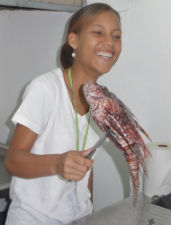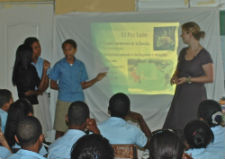FOR IMMEDIATE RELEASE:
Thursday, June 28, 2012
Peace Corps Volunteer Organizes Sustainable Cooking Classes in the Dominican Republic
Students learn how to prepare dishes with lionfish and other local ingredients
WASHINGTON, D.C., June 28, 2012 – Peace Corps volunteer Sabine Bergmann of Mill Valley, Calif., recently organized a 14-week sustainable culinary class with young women in her community in the Dominican Republic. Bergmann began the cooking seminar in April 2012 to address the invasion of lionfish, an invasive fish species, that have significantly endangered the fish population in the native coral reef.

“While the lionfish invasion poses a grave threat to native populations and fishermen’s incomes, it also poses an opportunity for community leaders to work with fishermen to create a market for the invasive fish,” said Bergmann, a graduate of Stanford University.
Bergmann said that students aged 13 to 17 use local ingredients to prepare a variety of lionfish dishes from various culinary traditions and attend classes that cover topics such as the ecological impact of lionfish pose to the local reef, the local impact of various fishing practices and attend lectures from local fishermen and chefs. Several of the youth group leaders have also organized a weekly local radio show to talk about the impact of the lionfish project and different environmental topics.

“Students will be encouraged to be inventive with their ingredients, inspiring with their actions, and excited about showing their community how protecting one’s ocean can be rewarding and tasty,” said Bergmann.
Participants are also encouraged to teach their friends and families the recipes from class, and contribute new recipes to create a lionfish cookbook.
Bergmann helped her community raise money through the Peace Corps Partnership Program (PCPP), a program that helps support Peace Corps volunteer and community projects worldwide. In order to receive PCPP funds, a community must make a 25 percent contribution to the total project cost and outline success indicators for the individual projects. This helps ensure community ownership and a greater chance of long-term sustainability. One hundred percent of each tax-deductible PCPP donation goes toward a development project.

About Peace Corps/Dominican Republic: More than 4,220 Peace Corps volunteers have served in the Dominican Republic since the program was established in 1962. Currently, 220 volunteers serve in the Dominican Republic. Volunteers work in the areas of community development, health, education, environment and business. Volunteers are trained and work in Spanish and basic Haitian Kreyol.
About the Peace Corps: Since President John F. Kennedy established the Peace Corps by executive order on March 1, 1961, more than 200,000 Americans have served in 139 host countries. Today, 9,095 volunteers are working with local communities in 75 host countries. Peace Corps volunteers must be U.S. citizens and at least 18 years of age. Peace Corps service is a 27-month commitment and the agency’s mission is to promote world peace and friendship and a better understanding between Americans and people of other countries. Visit www.peacecorps.gov for more information.
# # #
Contact us
All contactsGet press releases emailed to you right when they are issued.
Sign up now